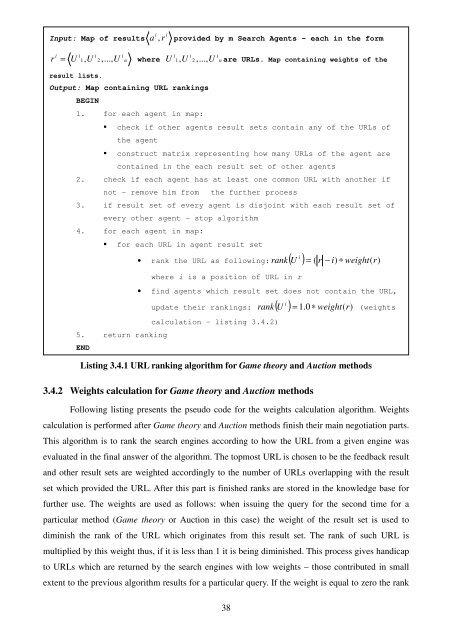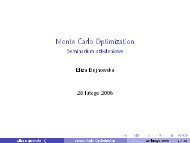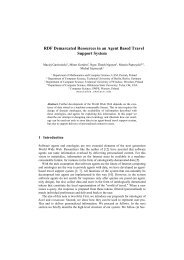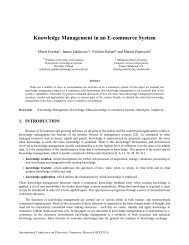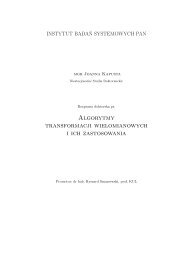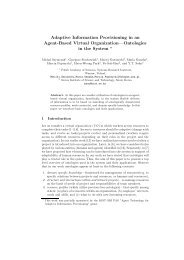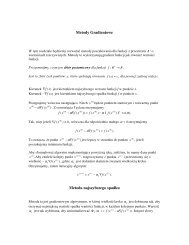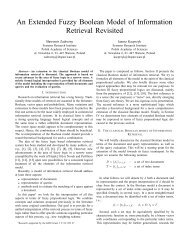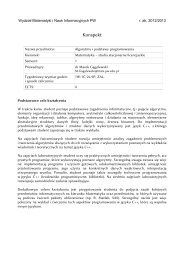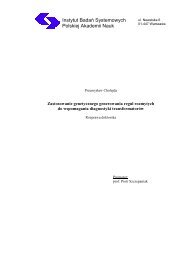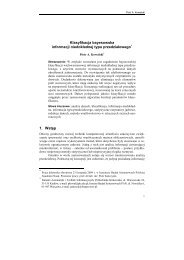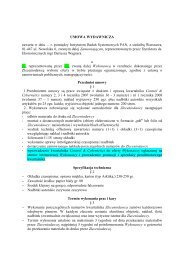Combining Information from Multiple Internet Sources
Combining Information from Multiple Internet Sources
Combining Information from Multiple Internet Sources
You also want an ePaper? Increase the reach of your titles
YUMPU automatically turns print PDFs into web optimized ePapers that Google loves.
Input: Map of results<br />
i<br />
a ,<br />
r<br />
i<br />
provided by m Search Agents - each in the form<br />
r 1, 2 ,...,<br />
i i i i<br />
= U U U n where U i<br />
1, U<br />
i<br />
2 ,...,<br />
U<br />
i<br />
nare URLs. Map containing weights of the<br />
result lists.<br />
Output: Map containing URL rankings<br />
BEGIN<br />
1. for each agent in map:<br />
check if other agents result sets contain any of the URLs of<br />
the agent<br />
construct matrix representing how many URLs of the agent are<br />
contained in the each result set of other agents<br />
2. check if each agent has at least one common URL with another if<br />
not – remove him <strong>from</strong> the further process<br />
3. if result set of every agent is disjoint with each result set of<br />
every other agent - stop algorithm<br />
4. for each agent in map:<br />
for each URL in agent result set<br />
i<br />
• rank the URL as following: rank( U ) ( r i)<br />
weight(<br />
r)<br />
where i is a position of URL in r<br />
• find agents which result set does not contain the URL,<br />
i<br />
update their rankings: rank( U ) 1.0<br />
∗ weight(<br />
r)<br />
calculation – listing 3.4.2)<br />
5. return ranking<br />
END<br />
Listing 3.4.1 URL ranking algorithm for Game theory and Auction methods<br />
3.4.2 Weights calculation for Game theory and Auction methods<br />
Following listing presents the pseudo code for the weights calculation algorithm. Weights<br />
calculation is performed after Game theory and Auction methods finish their main negotiation parts.<br />
This algorithm is to rank the search engines according to how the URL <strong>from</strong> a given engine was<br />
evaluated in the final answer of the algorithm. The topmost URL is chosen to be the feedback result<br />
and other result sets are weighted accordingly to the number of URLs overlapping with the result<br />
set which provided the URL. After this part is finished ranks are stored in the knowledge base for<br />
further use. The weights are used as follows: when issuing the query for the second time for a<br />
particular method (Game theory or Auction in this case) the weight of the result set is used to<br />
diminish the rank of the URL which originates <strong>from</strong> this result set. The rank of such URL is<br />
multiplied by this weight thus, if it is less than 1 it is being diminished. This process gives handicap<br />
to URLs which are returned by the search engines with low weights – those contributed in small<br />
extent to the previous algorithm results for a particular query. If the weight is equal to zero the rank<br />
38<br />
=<br />
−<br />
∗<br />
= (weights


